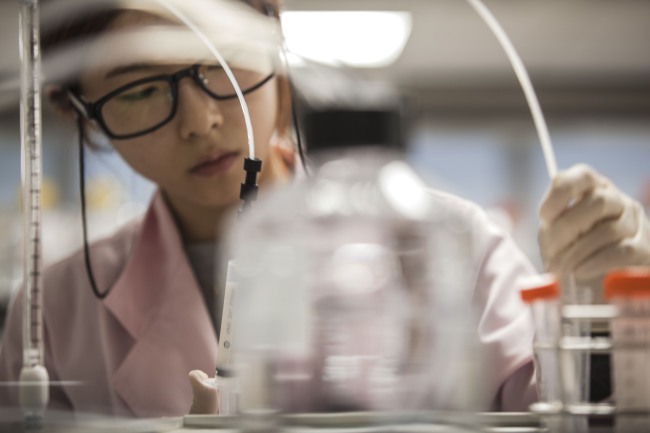Samsung Bioepis' Remicade biosimilar wins US FDA approval
이 글자크기로 변경됩니다.
(예시) 가장 빠른 뉴스가 있고 다양한 정보, 쌍방향 소통이 숨쉬는 다음뉴스를 만나보세요. 다음뉴스는 국내외 주요이슈와 실시간 속보, 문화생활 및 다양한 분야의 뉴스를 입체적으로 전달하고 있습니다.
South Korea’s Samsung Bioepis won the US Food and Drug Administration’s approval for its biosimilar copy of Johnson & Johnson’s Remicade on Saturday, becoming a new challenger to the sales of the pharmaceutical giant’s blockbuster autoimmune disease treatment in the US.
The US FDA has granted approval to Samsung’s Renflexis, a biosimilar referencing Remicade (infliximab). Akin to generics of chemical drugs, biosimilars refer to cheaper, near-replicas of live cell biologic drugs whose patents have expired.

Renflexis is the second Remicade-referencing biosimilar to score approval by the US regulator. The agency had approved Korea-based Celltrion’s Inflectra in April last year, paving the way for the firm’s marketing partner Pfizer to start selling the drug in the US from November.
“Through relentless process innovation and an uncompromising commitment to quality, we remain committed to advancing one of the industry‘s strongest biosimilar pipelines,” Samsung Bioepis spokesperson Hyun Min-gi said.
With the new approval, J&J’s Remicade — the firm’s topselling drug with annual sales of around $5 billion — will now be competing against two cheaper alternative infliximab drugs in the US.
Samsung Bioepis’ Renflexis will be sold and marketed in the US via the firm’s local partner Merck & Co, also known as MSD. The firms have yet to announce a price scheme for its new biosimilar.
Meanwhile, Pfizer has priced Inflectra 15 percent cheaper than the originator drug in the US, and has been steadily eating into Pfizer’s market share in the country over the past few months.
Remicade’s US sales fell 2.4 percent on-year to $1.18 billion in the first quarter of this year, while worldwide sales dropped 6 percent on-year to $1.67 billion during the period, according to J&J’s quarterly earnings report.
Renflexis is likely to begin sales from late this year, as companies are required to wait 180 days after approval to begin selling a biosimilar, according to the latest interpretation of local US regulations governing the new biologic drug category.
The two Remicade-referencing biosimilars approved in the US have already launched in additional markets including major European countries, Australia, Canada as well as Korea.
Celltrion has been selling Inflectra under the name Remsima in Europe since 2014, while Samsung Bioepis began selling Renflexis in the region under the name Flixabi from 2016 via its marketing partner and minority shareholder Biogen.
The Korean drugmakers have already introduced or are awaiting regulatory approval for biosimilars referencing other blockbuster drugs sold worldwide.
Celltrion’s Rituxan (rituximab) biosimilar, Truxima, has scored approval from the European Medicines Agency and has begun sales in the region. It is seeking the EMA’s approval of its Herceptin (trastuzumab) biosimilar, Herzuma, as well.
Samsung Bioepis has also commercialized a biosimilar referencing Amgen’s Enbrel (etanercept) via Biogen in European markets, Australia, Canada and Korea. It is currently awaiting the EMA’s approval of its biosimilars referencing Herceptin as well as Humira (adalimumab).
A biosimilar referencing Lantus (insulin glargine), developed by MSD with partial funding from Samsung Bioepis, obtained the EMA’s approval in January this year, and has begun sales in the region under the name Lusduna.
Samsung Bioepis is 93.3 percent owned by Kospi-listed Samsung BioLogics, a contract manufacturer of biologic drugs developed by clients including Roche and Bristol-Myers Squibb. The remainder of the shares are held by US-based Biogen.
The two Samsung units are at the heart of Samsung Group’s push into biopharmaceuticals as it seeks leadership in new, promising sectors beyond its flagship electronics business.
Samsung Bioepis had sought to pursue an initial public offering on the US-based Nasdaq in 2015, yet postponed its plans citing market volatility. The firm has yet to announce a timetable for its IPO.
By Sohn Ji-young (jys@heraldcorp.com)
<ⓒKoreaHerald(www.koreaherald.com)무단전재 및 재배포 금지>
Copyright © 코리아헤럴드. 무단전재 및 재배포 금지.